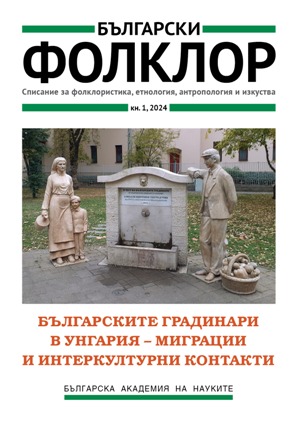„Третият път“ – Националната земеделска партия в Унгария и българските градинари в периода между двете световни войни
“Third Way” – The Hungarian National Peasant Party and the Bulgarian Market-Gardeners in the Interwar Period
Author(s): Ferenc BódiSubject(s): Politics / Political Sciences, Politics, History, Anthropology, Social Sciences, Language and Literature Studies, Economy, Cultural history, National Economy, Business Economy / Management, Micro-Economics, Agriculture, Studies of Literature, Political Theory, Political Sciences, Civil Society, Governance, Sociology, Economic history, Ethnohistory, History of ideas, Political history, Social history, Recent History (1900 till today), Hungarian Literature, Labor relations, Economic policy, Government/Political systems, International relations/trade, Political behavior, Political economy, Politics and communication, Politics and society, History and theory of political science, Cultural Anthropology / Ethnology, Culture and social structure , Social development, Social differentiation, Social Theory, Policy, planning, forecast and speculation, Nationalism Studies, Rural and urban sociology, Sociobiology, Sociology of Culture, Economic development, Environmental interactions, Pre-WW I & WW I (1900 -1919), Interwar Period (1920 - 1939), WW II and following years (1940 - 1949), Migration Studies, Inter-Ethnic Relations, Ethnic Minorities Studies, Human Resources in Economy, Sociology of Politics, Socio-Economic Research, Geopolitics, Politics of History/Memory, Politics and Identity, Identity of Collectives, Asylum, Refugees, Migration as Policy-fields
Published by: Институт за етнология и фолклористика с Етнографски музей при БАН
Keywords: Bulgarian market-gardeners; Hungary; peasants, populist movement; Austro-Hungarian monarchy
Summary/Abstract: The article is dedicated to a hitherto unexplored element of the Bulgarian–Hungarian relationship from the period between the two world wars – the Hungarian popular movement (March Front), whose ideas found inspiration from the Bulgarian gardeners in Hungary. The movement that later the National Peasant Party put the “Garden Hungary” program on its banner in which the agrarian reforms and the wider civil participation of peasants in Hungarian society held a special place. Many of the elements in this program drew examples from the Bulgarian gardeners in Hungary with their specific organization of labour, collectivist spirit, and a sustainable economic model linking the land work and the new market relations at the end of the 19th and the beginning of the 20th century. In his study “Towards Garden Hungary” Imre Somogyi described in detail the techniques that Bulgarian market gardeners used in vegetable growing. In the social philosophy of László Németh, “Garden Hungary” had the meanings of a socio-economic model that could eliminate rural poverty.
Journal: Български фолклор
- Issue Year: L/2024
- Issue No: 1
- Page Range: 045-062
- Page Count: 18
- Language: Bulgarian
- Content File-PDF

